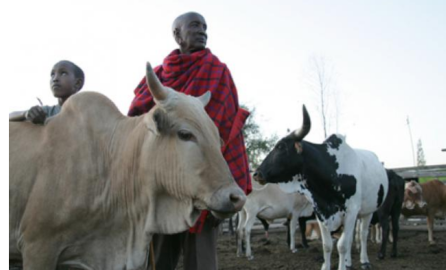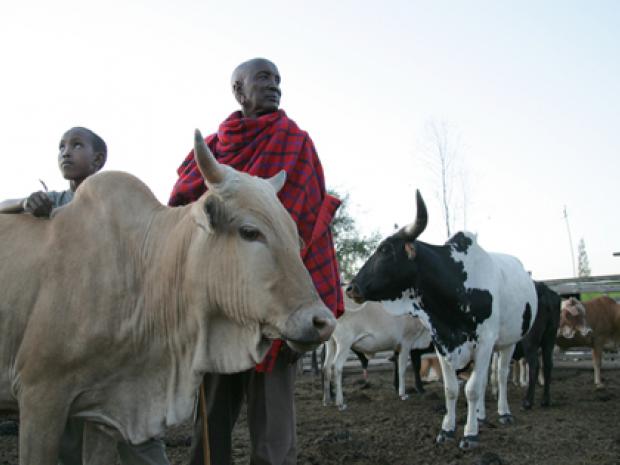Pastoralists can get a bad name. These semi-nomadic communities are sometimes portrayed as living an outmoded way of life, feuding and degrading the environment with their herd before moving to a new area. The reality is different. The European Commission supports pastoralism as one of the most efficient and ecologically friendly ways to draw value from arid and semi-arid land.
However, with the worsening effects of climate change, population growth and competing claims for land, preventing conflict and ensuring pastoralists remain mobile is more difficult than ever.
The African Union estimates there are around 268 million pastoralists in Africa covering almost 40% of the continent. They are defined “by a high reliance on livestock as a source of economic and social wellbeing, and various types of strategic mobility to access water and grazing resources in areas of high rainfall variability”.
Yet this mobility can see pastoralists fall between the cracks in policy making. Roberto Aparicio-Martin, who is responsible for pastoralism in the Rural Development, Food Security, Nutrition Unit at EuropeAid, said that from a policy perspective, “pastoralists are everywhere and nowhere”.
Maasai father and son tend to their cattle in their paddock in Kitengela, Kenya (photo credit: ILRI/Stevie Mann).
The provision of basic services is made more complicated by pastoralists’ frequent movements. Governments may tend to be reluctant to allocate resources to groups that do not reside solely in their country. Pastoralists' ability to seek greener pastures in order to allow the land to recover has also been increasingly constrained in recent years.
“[Climate change] is something I cannot emphasise more,” said Peter Ken Otieno, a senior programme manager at the Resource Conflict Institute (RECONCILE) in Kenya. “It’s an external issue, which then bleeds into community livelihoods in two scenarios: drought and floods.”
In the Sahel region, Mr Aparicio-Martin said “20 years ago pastoralists knew they could go south after the harvest in some areas to graze their herds”. Extreme and increasingly unpredictable weather and the presence of armed groups in some regions now make this more difficult.
Disputes over land rights are common among pastoralists' groups and also between pastoralists and sedentary cultivators. Again, climate change and increasing demographic pressure are aggravating factors. And in the absence of proper land rights, pastoralists' grazing areas are also often considered as vacant land available to be sold or leased to private investors.
Maasai pastoralists in Tanzania have been affected by the establishment of national parks, with conservation now making up almost 30 per cent of the country’s land.
“Conservation is good and it can also work with pastoralism,” said Edward Loure, executive director of the Ujamaa Community Resource Team, “but do you want to turn all of Tanzania into conservation?”
Last month the European Commission Infopoint held a lunchtime conference organised by the Coalition for European Lobbies on Eastern African Pastoralism (CELEP) on the theme of ‘Pastoralism and Conflict’.
“Conflicts in pastoralist areas are mainly caused by cattle raiding, economic and social insecurity, [inadaptive] land policies, institutions and investments,” said Koen Van Troos, education and policy coordinator from Veterinarians Without Borders (Vétérinaires sans Frontières – VSF), the Brussels secretariat for CELEP.
On the problem of cattle raiding, Shoba Liban, a board member from the Isiolo Region in the Pastoralist Development Network in Kenya, suggested better branding technology could replace the signs traditionally used to identify cattle, which are prone to fall off as animals gain weight.
“Animals can be stolen from one county but the person who did that will not be traced. It is a cycle of [...] people stealing from each other, communities of pastoralists killing and taking animals from each other, which is not ok. But the government are also not able to deal with this because they think it is a tradition... If this modern technology is used and the animals are branded they know it is from this county.”
Further recommendations for the European Union from the Infopoint conference included:
- increasing community-based conflict resolution plans and programmes in pastoralist areas to allow communities to decide their own priorities,
- more research on private investments to measure the impact of these on local communities, and
- implementing the African Union Policy Framework for Pastoralism in Africa, which was adopted in 2010 and designed to protect the rights and livelihoods of pastoralists while reinforcing the economic contribution made by their livestock. (In Niger for instance, the sector makes up 21% of the country’s exports).
Last November the ACP-EU Joint Parliamentary Assembly passed a resolution calling on African, Caribbean and Pacific states and local authorities to align their policies with the Framework for Pastoralism. Mr Van Troos said implementing sections on security in the drylands is particularly important, “such as the instalment of police posts in the remote centres in pastoralist areas and specific measures to advocate against the proliferation of small arms”.
This was also acknowledged by Ms Liban: “On this hand we talk about peace building and then on the other hand we are not able to control what is coming into our market in terms of light weapons.”
Human rights, and in particular women’s rights, are another area requiring improvement.
“The cultural practice of female genital mutilation is still with us”, Ms Liban said. “I don’t think [pastoralist communities] believe in women’s ability to lead. So in terms of the elective positions it is very hard to get a woman. In fact, in the Kenyan situation it was affirmative action that supported women to be able to be elected...”
Although addressing cultural practices through international policies remains a challenge, Mr Otieno said that the European Instrument for Democracy and Human Rights had been a particularly effective tool for addressing conflict by strengthening civil society actors.
|
For more information about the EIDHR is available here in this interview with Patrice Lenormand, Deputy Head of Unit in the Governance, Democracy, Gender, Human Rights Unit in EuropeAid. http://capacity4dev.ec.europa.eu/pubsecjhr/blog/video-patrice-lenormand… |
Community dialogue, including cross-border meetings, complemented a number of micro-projects such as improving water security (often a source of conflict) and creating joint markets.
“One of the biggest challenges in addressing conflict amongst the pastoral communities is long and historical suspicion that has been built over time that communities operate in their own territory.”
Mr Aparicio-Martin said in some cases sedentary cultivators tend to invest their profits in cattle and reach a deal with nomadic pastoralists so as the latter look after their cattle.
“There’s conflict, but there is also collaboration.”
|
The European Commission is part of two flagship projects to improve food security in Africa: Supporting Horn of Africa Resilience (SHARE) and the Global Alliance for Resilience Initiative (AGIR). In 2012 the European Commission developed a new approach for the Horn of Africa - Supporting Horn of Africa Resilience (SHARE) - that aims to break the vicious cycle of crises in the region. In the framework of SHARE, the European Commission has been investing more than €270 million in supporting recovery from the last drought in the Horn of Africa through close cooperation between humanitarian aid and long-term development. It is also working to strengthen the countries' and population's resilience to future crisis. More information is here. The Global Alliance for Resilience Initiative - Sahel (AGIR) was launched as a follow-up to a high-level consultation organised by the European Union on June 2012 in Brussels. In response to chronic food insecurity and malnutrition, the initiative aims to promote greater resilience among vulnerable populations by creating greater synergy between emergency actions and between long-term strategies aimed at addressing the root causes of food crises. In line with the principles of the Paris Declaration on Aid Effectiveness, the global alliance puts emphasis on donor co-ordination and the building of synergy in order to foster effective collective action for sustainable food security. More information is here. For further information on pastoralism on Capacity4dev, you can join and share in this newly created Group: http://capacity4dev.ec.europa.eu/pastoralism/ And explore: http://capacity4dev.ec.europa.eu/pubagrurdev/searchgroup/pastoral |
This collaborative piece was drafted with input from Roberto Aparicio-Martin, Koen Van Troos and Peter Ken Otieno, with support from the capacity4dev.eu Coordination Team. Teaser image courtesy of ILRI / Mann.




Log in with your EU Login account to post or comment on the platform.